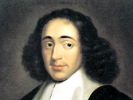
Correspondence, by Benedict de Spinoza, [1883], at sacred-texts.com

Correspondence, by Benedict de Spinoza, [1883], at sacred-texts.com
[Schaller asks for answers to four questions of his friend Tschirnhausen on the attributes of God, and mentions that Tschirnhausen has removed the unfavourable opinion of Spinoza lately conceived by Boyle and Oldenburg.]
Most distinguished and excellent Sir,—I should blush for my silence, which has lasted so long, and has laid me open to the charge of ingratitude for your kindness extended to me beyond my merits, if I did not reflect that your generous courtesy inclines rather to excuse than to accuse, and also know that you devote your leisure, for the common good of your friends, to serious studies, which it would be harmful and injurious to disturb without due cause. For this reason I have been silent, and have meanwhile been content to hear from friends of your good health: I send you this letter to inform you, that our noble friend von Tschirnhausen is enjoying the same in England, and has three times in the letters he has sent me bidden
me convey his kindest regards to the master, again bidding me request from you the solution of the following questions, and forward to him your hoped-for answer: would the master be pleased to convince him by positive proof, not by a reduction to the impossible, that we cannot know any attributes of God, save thought and extension? Further, whether it follows that creatures constituted under other attributes can form no idea of extension? If so, it would follow that there must be as many worlds as there are attributes of God. For instance, there would be as much room for extension in worlds affected by other attributes, as there actually exists of extension in our world. But as we perceive nothing save thought besides extension, so creatures in the other world would perceive nothing besides the attributes of that world and thought.
Secondly, as the understanding of God differs from our understanding as much in essence as in existence, it has, therefore, nothing in common with it; therefore (by Ethics, I. iii.) God's understanding cannot be the cause of our own.
Thirdly (in Ethics, I. x. note) you say, that nothing in nature is clearer than that every entity must be conceived under some attribute (this I thoroughly understand), and that the more it has of reality or being, the more attributes appertain to it. It seems to follow from this, that there are entities possessing three, four, or more attributes (though we gather from what has been demonstrated that every being consists only of two attributes, namely, a certain attribute of God and the idea of that attribute).
Fourthly, I should like to have examples of those things which are immediately produced by God, and those which are produced through the means of some infinite modification. Thought and extension seem to be of the former kind; understanding in thought and motion in extension seem to be of the latter.
And these are the points which our said friend von Tschirnhausen joins with me in wishing to have explained by your excellence, if perchance your spare time allows it. He further relates, that Mr. Boyle and Oldenburg had formed a strange idea of your personal character, but that he has not only removed it, but also given reasons, which have not only led them back to a most worthy and
favourable opinion thereof, but also made them value most highly the Theologico-Political Treatise. Of this I have not ventured to inform you, because of your health. Be assured that I am, and live,
Most noble sir,
for every good office your most devoted servant,
G. H. SCHALLER.
Amsterdam, 25 July, 1675.
Mr. à Gent and J. Rieuwerts dutifully greet you.
396:1 In the Opera Posthuma this letter is arranged, so as to seem to be from the person who puts the questions himself, and the names of Schaller and Tschirnhausen are suppressed.